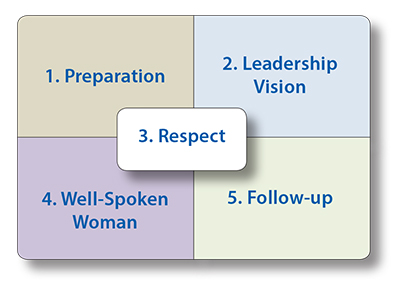Ji-Hyun Lee and Jessica Kohlschmidt

This article is a summary of an hour-long talk at the Women in Statistics and Data Science (WSDS) Conference in Charlotte, North Carolina, in October of 2016. The talk presumed two pre-specified conditions: you are invited for a site interview (i.e., your CV/résumé and cover letter appealed to the job seeker) and you really want the position.
The five essentials for your job interview are illustrated in the diagram at right. As seen, each essential is next to other related essentials, while the respect essential is related to all aspects.
 Jessica Kohlschmidt is a biostatistician at The Ohio State University Comprehensive Cancer Center. As a dedicated statistician, she works with a research group that focuses on acute myeloid leukemia.
Jessica Kohlschmidt is a biostatistician at The Ohio State University Comprehensive Cancer Center. As a dedicated statistician, she works with a research group that focuses on acute myeloid leukemia.
 Ji-Hyun Lee is a professor in the department of internal medicine at the University of New Mexico School of Medicine. She is also 2017 president of the Caucus for Women in Statistics.
Ji-Hyun Lee is a professor in the department of internal medicine at the University of New Mexico School of Medicine. She is also 2017 president of the Caucus for Women in Statistics.
1. Preparation
As you are invited to the site interview, you are thought of as a potential employee. It means they did their homework. In turn, you need to do your homework before the site interview.
Reiterate and clarify what you are looking for in this position: Why did you apply for this particular site? What is the site looking for? Do you have long-term and short-term goals you want to achieve and grow at that site? What strengths and knowledge do you have that meet their demanding areas?
Research the site, people whom you will meet, and their scientific research areas as much as you can.
If you give a seminar, call the host to figure it out who the majority of your potential audience will be. If needed, fine tune your seminar to match your content and technical details to the audience. This seminar is not only to show your scientific strength and potential growth, but also to show how effectively you can communicate with statisticians and nonstatistical members at the job.
When arranging arrival and departure times, make sure they will not affect the formal interview schedules.
2. Leadership Vision
We often think leadership is only related to a certain type of job position, such as department chair, director, or dean. However, we advocate the four leadership types suggested by the National Outdoor Leadership School: designated leadership, active “followership,” peer leadership, and self-leadership.
- Designated leadership means taking responsibility for the group and guiding it toward its goals. Also, in this role, you would determine how the group will achieve these goals.
- Active followership means supporting and following the designated leader. In addition, you would participate in group decision-making by giving input and seeking clarity.
- Peer leadership means the team works together and supports each other in achieving group goals.
- Self-leadership means each person takes care of self so he/she can take care of the group. Each person shows personal initiative and character.
According to this classification, we—all ordinary people—are leaders. Then, why does the concept of leadership have a significant effect on your job interview, even at the entry level? It is because having the leadership vision enables you to clarify and focus the whole process—envision how your short- and long-term goals can be achieved as self-leader. You are able to envision your future colleagues as peer leaders and active followers, and your immediate boss can be evaluated based on their role as the designated leader.
3. Respect
The bottom line for this essential is that you respect the site you visit and the people you meet. Your attitude toward those interview meetings should be weighted as seriously as your CV/résumé, experience, training, and technical skills. At the same time, you also deserve respect during the interview process. While uncommon, you may run into some less-than-ideal situations, such as some employees behaving badly during the interview process. This could be a hint of a toxic workplace environment at your future job. In contrast, behaving overly passive, like a desperate beggar for a job, shows a lack of respect for yourself. The meetings need to be profitable to both sides and emphasize that the interviewer’s and your efforts are valuable.
4. Well-Spoken Woman
Effective communication will influence the individuals you meet, whether in person or during a seminar presentation.
- The visual impact. You may have heard the ‘10 seconds first impression’ term. This encompasses personal grooming, dress, body language, and facial expressions. Your look needs to be professional. These days, we also have to emphasize that you need to forget your cellphone/tablet during the job-interview process.
- Verbal impact. How can you communicate? Are you a conscious communicator? Do you have a habit of using too many repetitive filler words such as “you know,” “actually,” “definitely,” and “right.” If so, try to be more conscious and be comfortable with silence. Also, use positive words, leverage your voice, use the power of a smile, and keep eye contact. It takes effort to fix or improve your verbal communication. If you are unsure, record your voice, review the recording being conscious of others, and rehearse potential questions and answers you may encounter during the job interview.
- Clarity affects what you communicate. Your talk should be focused and relevant for any meeting. Is it clear to others you know what you do? If you give a seminar, don’t forget “the curse of knowledge (CK)”: Once you become an expert on a topic, you’ve forgotten what it’s like to not know what you know. You can no longer relate to others, since you know so much. To avoid the CK, focus your headline and make everything else support it. Also reflect on others’ interests and speak in those terms. Use stories to help others connect to you and your message and add visual elements to make your message come alive. All these ideas will make what you are talking about seem understandable. Again, too many repetitive filler words distract audiences.
5. Follow-Up
We are aware that this essential piece could be controversial. While several colleagues do not agree or believe a thank-you note is important, we still suggest sending one. It is related to the respect essential. Thank the interviewers for their time and effort. Email is quite acceptable these days, and including a few relevant follow-up questions is appropriate. If you don’t hear back for a long time and you really like the position, send an email reiterating your interest in the position. Otherwise, move on and don’t take it personally. Even though you are disappointed and feel it was wasted time and energy, remember the interview process can be an effective way to build a network.
In Summary
The job interview process is stressful and consumes time and energy. Ultimately, the interview may not result in getting the position; however, the process can have positive aspects. Getting to know people in the same field, building networks leading to other professional opportunities, and learning about others’ visions are a few examples of positive outcomes of interviews.



Leave a Reply